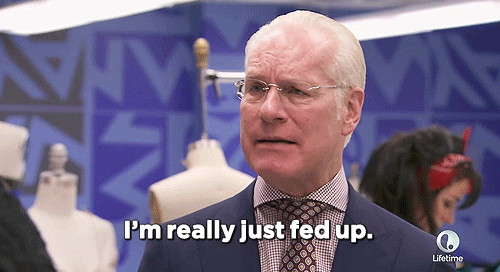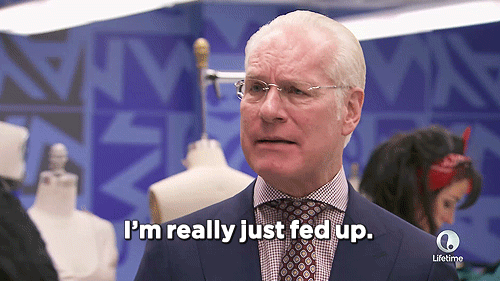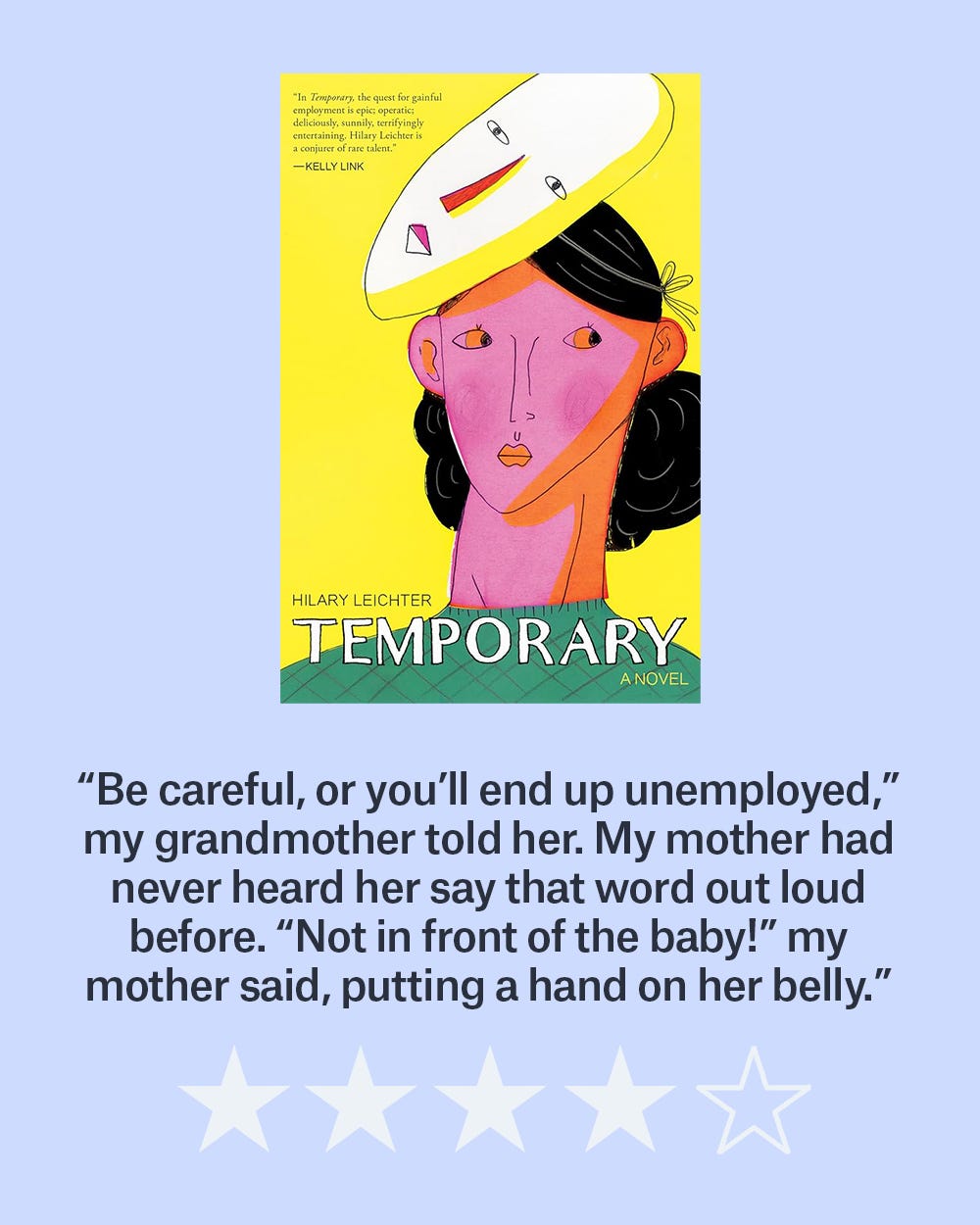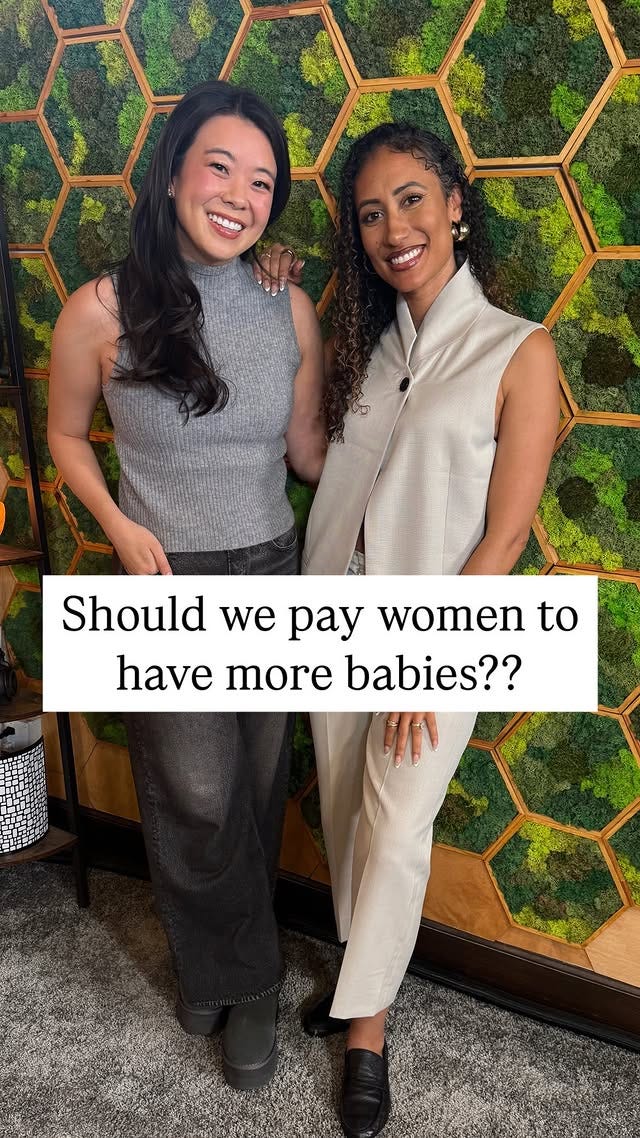#111. "Don't you get fed up with all the mum content?"
I cannot guarantee my answer doesn't get a little weird
Hey! Today is the very first issue of Storytime™ – a new series where you ask me your questions or tell me your stories, and I’ll do my best to answer them with the empathy (and humor) you deserve. Have your own story/question? Submit it here.
“Honestly, don't you sometimes get fed up with all the mum content?
Online I see it mainly on Substack. I don't really use Instagram/TikTok anymore, so no idea how it is over there, but on Substack, I subscribed to many writers that I thought would talk about books or fashion or whatever else, and 90% of the time, they end up talking about their kids or what being a mother is like. Even the London Times app now has a ‘parenting’ sub-section. All the power to mothers, obviously, but I'm a little (or maybe even a lot) tired of seemingly all women aged 28-45 talking mainly about parenting. I understand that having children and parenting is a big part of your life once you're in the thick of it but... well, I'm just tired of it all.
I don't want children myself, and I don't like them that much (I know, you're not supposed to say that). I mean, some kids are great, some are just okay, and some are little monsters – just like adults in my eyes. But mainly? I don't want to hear about them all the time – it's honestly just boring to me. Have you ever felt that way?
How do you tell your friends with children that you like their kid(s), but you don't really want to hear about all the 'amazing things' the kid supposedly said or did – you'd rather talk about, I don't know, shoes? How do I navigate online content and IRL friendships without missing out on good writing (pertaining to content) or hurting my friends? Sometimes I think it would be easier to just get myself a friend group who thinks like me regarding children, but I do love the friends I have (and most of their kids). It's haaaaaaaard making friends as an adult, especially as a person with social anxiety. Sorry, this question got so much longer than I planned. I'd be grateful for any advice or just a "Get over it, you idiot"! – Aurora, 36 (sending love from Germany)
FIRST OF ALL, I would never tell you to just get over it, because I think this is a really real question for a lot of people out there, which is why I wanted to start here for the first issue of Storytime™!!
Second, let me confess something. When I read the first sentence of your question, my stomach dropped. I thought you were about to ask me if I ever get sick of writing about this topic every week, which is a secret fear I harbor. I don’t get sick of it, like at all, but I have this fear that people perceive me as “that girl that only talks about that one thing ew why doesn’t she get over herself,” which I’m telling you only because I feel like it’s relevant to your question.
I think the reason we (you and me both) perceive that women ages 28-45 are talking a lot about parenthood is because… they are! In my limited experience as one human woman in the world, I think people often talk about what they’re currently experiencing most immediately. Sometimes that will be navigating a shitty job market, gasping at the horrors of the economy (a latte is how much right now???), or swimming through the seventh circle of hell also known as online dating. You’re 36, so for a lot of your friends and people you follow online, the thing they’re probably experiencing most acutely is the early years of parenthood – the time when it feels most all-consuming. Parents with younger kids are experiencing “kid stuff” day in and day out, almost 24/7/365.
This comes in two flavors, though. Contrary to what you may assume, I have a lot of mom friends (and follow a lot of moms online). Some moms are cherry slushies, and others are blue raspberry. Both are equally delicious, they’re just different. Stay with me, I promise it will make sense.
Cherry slushie moms like to talk about their kids and their joys/struggles with parenting to process it all out loud. They process their experiences and worldview through the lens of being a parent, and their kids come up in conversation often and inevitably.
Blue raspberry moms, on the other hand, are largely the opposite. They don’t like to talk about their kids very much when they’re with other adults because they need intellectual stimulation after a day of reading ten thousand board books about dinosaurs or poop or whatever. When you’re hanging out, they’ve had enough of kid stuff and want to drink wine and talk about literally anything else (especially when they’re in a space where there are a lot of women without children present.)
When I recognized this difference, I think it helped me understand life (and my friends) a little better. To go with your shoe reference, Gucci slides aren’t any better or worse than Prada slingbacks, right? They’re just different. Maybe one is a better fit for your life right now.
So the question becomes: How much tolerance do you have to hear about something that doesn’t inherently interest you? And how many cherry vs. blue raspberry moms/creators do you interact with either online or IRL?
I’m an interesting case because I interact with significantly more blue raspberry moms, though as a person, I’m 1000% a cherry slushie – I’m just not a mom. I process absolutely everything by talking about it or writing it down. That’s why I can talk (and write) about being child-free by choice and friendships and being a millennial woman dealing with the horrors of the Trump administration until my brain explodes!!!!!
I honestly don’t find myself in a lot of conversations or spaces where I feel unwelcome, and when kids come up, it feels natural and not like it’s the dominant force of the conversation. Sometimes I actually wish my friends would tell me more about their kids! I like my friends and I want to hear about stuff that’s important to them, you know? I realize maybe I’m not the prime candidate to share kid stuff with, and I worry about how my friends perceive me sometimes just based on the fact that I write this newsletter, you know what I mean?
But I totally hear you – I do know what it’s like to be sitting lost in a conversation about parenting/kid stuff where you wish people would talk about literally anything else. We’re about the same age, but I think this feeling could potentially increase for me when more of my friends become parents. I do expect to eventually be one of a fairly small group of women who don’t have kids (among all my IRL friends) and we’ll see how I feel once the scales tip in that direction. I haven’t done the math, but I think my friends are about 50/50 right now.
So! What to do? Online, my advice to you is to hit the unsubscribe button on anyone you can easily identify as a cherry slushie mom, or dial waaaaay back in your consumption of that person’s content. This just might not be the right kind of creator for you right now – and that’s totally fine, by the way. (I had to do this with someone recently, and it felt sad and weird and freeing and right all at the same time.) There is so much good content out there, and so little time to consume it all. Anything absolutely essential will find its way to you somehow through different means, but I wouldn’t worry too much about missing out on great content. You choose the spaces you occupy online and the essays you read – why not go where you feel most welcome? I had quite a few people leave this newsletter when I rebranded to THE OPT OUT last summer, because of course I did. Some people have no need for a child-free cherry slushie that’s sitting at the machine with the handle broken and it’s overflowing rivers of red on all sides of the Big Gulp-sized cup. And that’s okay!
Navigating all of this with your friends is very different, though. You asked how you tell your friends you don’t want to hear as much about their kids, and my honest answer is: You don’t. It will hurt your friend’s feelings, possibly doing irrevocable damage.
It sounds to me like a majority of your mom friends might be cherry slushies. Do you have any blue raspberry moms in your circle? I don’t think you should get rid of any of your cherry flavored friendships, but I’m saying that right now, these might not be the friendships to pour your energy into. Stepping back a bit might do both of you a favor. On the other hand, blue slushie moms might be like, “For the love of god, Aurora, take me out for a glass of wine and tell me about the great pair of shoes you just bought!!!!!” I have mom friends like this and I wouldn’t trade them for ANYTHING. Be patient when they have scheduling conflicts. It’s always worth the wait.
When I do find myself in conversations about kids/parenting, I try to approach it in a mindset of a curious student. I’m a fucking idiot when it comes to mom stuff (or at least I used to be), so I can always think of a question to ask. Just because I’ll never be a parent doesn’t mean I can’t find it interesting – like an alien world I’ll never visit, but can observe any time I want through the people I love. Like, the fact that there is a tool out there created solely to suck snot out of a baby’s nose is disgusting and hysterically funny! (Lot of my parent friends feel that way, too!!) You might have more in common with your mom friends than you think.
I am a student of reality TV, so I can make anything more dramatic or interesting if I try hard enough. Why are babies obsessed with dinosaurs? (Is that evolutionary, somehow?) What is [insert baby’s name]’s favorite food to throw across the room and why do we think that is? Hear that sound the baby’s making by crinkling the Sun Chips bag? Sounds like ASMR – she should have her own YouTube channel, make you millions. Retire early.
Hang in there. Being in your mid-thirties is around the time when this shit really starts to hit the fan, as you (like me) suddenly find yourself in a very different place in life than many of your friends. That’s okay. My husband is five years older than me, and a lot of his friends are in their 40s and 50s. Eventually, it does get a lot better, and it won’t always feel so all-consuming. Eventually your friends’ kids will be 17 and you can take them out for milkshakes at a diner in downtown Minneapolis at 1 a.m. after a fancy-ass holiday party your friend (their parent) snuck them into. And that, my dear Aurora, is fucking priceless. x
Have your own story/question for me? Submit it here:
“How Did Having Babies Become Right-Wing?” by Madeline Kearns for The Free Press
This is behind a paywall, but my mom is a subscriber and forwarded it to me. Lots to say about this, much of it actually positive (The Free Press is a trustworthy yet slightly right of center publication), but I’ll save my inevitably lengthy commentary so you can read some highlights from the piece below. Madeline Kearns, a pregnant reporter, went to NatalCon 2025 and reported on her experience there:
“It was basically inevitable that natalism would be seen as right-wing,” said father-of-four Bryan Caplan, the author of Selfish Reasons to Have More Kids and a speaker at this year’s NatalCon. Why? “Because it’s disagreeing with two left-wing things”—environmentalism, which, in its dominant form, posits that the population is too high already, and feminism. “By being a natalist you are, in effect, raising the status of traditional women and saying, at minimum: If there’s a trade-off between being maximally successful in your job and being a mom, it’s not clear that you should go with maximum success in your career.”
But if NatalCon’s aim was to save natalism from the culture war, it didn’t get off to a good start. That first night, as attendees tucked into chicken and mashed potatoes, right-wing provocateur Jack Posobiec took to the podium to deliver the opening remarks. “Our enemies want us dead,” he said, slowly and sternly, “so take them seriously.” (The enemies, he clarified, are “the Luigis, the Tesla terrorists, the woke, the globalists, the nihilists.”)
The speech ascended into a full-throated call to arms. “This is the war for civilization,” he said. “Every cradle is a victory!”
There was a smattering of applause as he stepped off the stage, but the woman sitting next to me seemed unimpressed. She introduced herself as Emma Brizius, 37, from Dallas, and told me she has been the full-time mom of five young children, including triplets, for the past nine years. She wasn’t impressed by the war talk. For her, natalism means helping would-be mothers, not haranguing them.
“Many young women are postponing or opting out of motherhood because they feel that they’ve sacrificed so much already for this career they’ve built, or this life they’ve created, and they’ve been given the message, ‘You’ll throw it all away if you have a child,’ ” said Brizius. “I think we should just build a society that doesn’t make women have to choose so much.”
“Pronatalism Isn’t a Solution, It’s a Problem” by Sarah Jones for Intelligencer (New York Magazine)
Madeline Kearns mentioned this in her piece (above), calling it “the left’s stance on pronatalism.” Excuse my bias, but this piece is briiiiilliant:
Having children is a process, and it’s neither good nor bad but neutral. You can’t divorce babymaking from its context; at some point you have to contend with a woman and her rights. You want people to make families? Well, families don’t birth children. Women do that. It’s work that you’re asking them to perform, at some risk to their well-being.
I ask, then, what it means to support women who long for children and those who don’t. And I see no other way to help us all except through reproductive justice. It explains why the fertility gap is real and why abortion bans are killing women. It is material, and of course it is; it was devised by women who know well what it means to live without free choice. It is not jargon but an open door. Women deserve more than rancid sentimentality at best and forced birth at worst, no matter how far our fertility rates fall. If we don’t figure this out, we’re headed to a bleak place, and that is a preventable fate.
“They Sold Us a Fantasy Wrapped in a Lanyard” by for Taboo + Toast
This essay reads more like a long poem about work and burnout and getting caught in the pyramid scheme of adulthood and capitalism and wow I’m so fucking here for it:
They told us to reach for the stars, so we spent our childhoods colouring in “When I Grow Up” worksheets, scribbling “lawyer!” “doctor!” “banker!” like good little robots. They fed us a fairytale where success was a corner office with a view, a LinkedIn headline dripping with prestige, and a lanyard that said “Hello, My Worth Is My Job Title.” We swallowed it whole, not realising the ladder we were climbing was propped against a mirage.
My experience of reading Temporary by Hilary Leichter was certainly affected by the fact that I read it about a week after I was let go from my job. Ha, ha. So very on the nose. It was our book club pick for March, so I persisted, though! I’m no quitter!
This slim, 208-page novel is a batshit crazy fever dream into literary fiction land where a young woman journeys through a series of temporary jobs in search of permanence. It’s one of those rare books where I enjoy having read it more than I enjoyed actually reading it, if that makes sense? Hilary Leichter is a real talent, though – almost every sentence can be pulled out as “quotable.” Come for the beautiful prose, stay for the commentary on work becoming your whole life.
Loved this exchange between Vivian Tu (Your Rich BFF) and Elaine Welteroth talking about the Trump administration’s idea to create a National Medal of Motherhood, which they would award to mothers with six kids or more (yes, this is real – this is one of the ways they’re considering trying to increase the birth rate that we didn’t get to last week, lol.)
Elaine: “The best way to encourage women to have more babies is to give them structural support. Which we lack severely in this country. And when you can’t afford to have a baby, how do you expect women to have six?”
Vivian: “There are severely lacking maternal protections. There’s no federally mandated parental leave. No support for childcare costs which are one of the highest expenses after shelter and transportation. I then have this child, this is my pride and joy, my baby. And I send them to school, and you can’t even promise me my kid’s going to be safe at school. Doesn’t feel very pro-life, it feels very pro birth.”
ICYMI, issue #1 of the Sheila Heti Summer Slow Read is ready for your listening pleasure!! I talked to my friend Rachel (37, undecided about parenthood, my close friend and also my husband’s ex-girlfriend) about strange bridal shower traditions from Wisconsin, motherhood FOMO, and the millennial search for life’s meaning. Pop on over and join us in the comments! Issue #2 with my friend
goes out on Sunday. We talk about ticking the boxes, feeling content with ambiguity, and that time we both intentionally blew up our lives.Any other advice for our question-asker this week? Any favorite blue raspberry slushie moms you like to follow? Mine is Leandra Medine Cohen, who writes about fashion and mentions mom stuff (or her extremely stylish kids) when it’s relevant to her outfits, but doesn’t when it’s not.
Leave a (nice, thoughtful, funny) comment before you go!:
















Mom of 2 here who is not a kid person (love/like my own and a few select others, but that’s it). You can be both!
This metaphor is really working for me. Except now I want a BR slushie that will almost certainly make me feel like shit. Great piece!!
I’m probably slightly more of a blue raspberry mom unless I’m really going through it and need to vent —or—I’m authentically feeling moved by something my kid did or something I learned through motherhood but when I think about it more, the latter I can feel more protective of. When I look at my writing, which is sort of a reflection of how I connect with friends, it’s a smattering. It’s just whatever is coming up for me.
In terms of the question, which I think is a very good one and one I have at times as a mother myself, is aligned with what Kelly shared. It makes sense you feel this way and it’s ok to reorient for a little bit toward where you feel more connected. In my experience people are talking through things because they can’t not. They’re working through something and that’s their right, just as it is yours to notice it’s hard to be present and compassionate in a conversation that feels mostly filled with parenting talk. There is the saying in the type of therapy I do, “you deserve the support that feels supportive to you.” I would say that could be applied on both ends of these friendships. They deserve connections with those who can get down into the muck of parenting with them and you deserve connections where you feel space to talk about what interests you—sometimes those things intersect and sometimes they don’t.